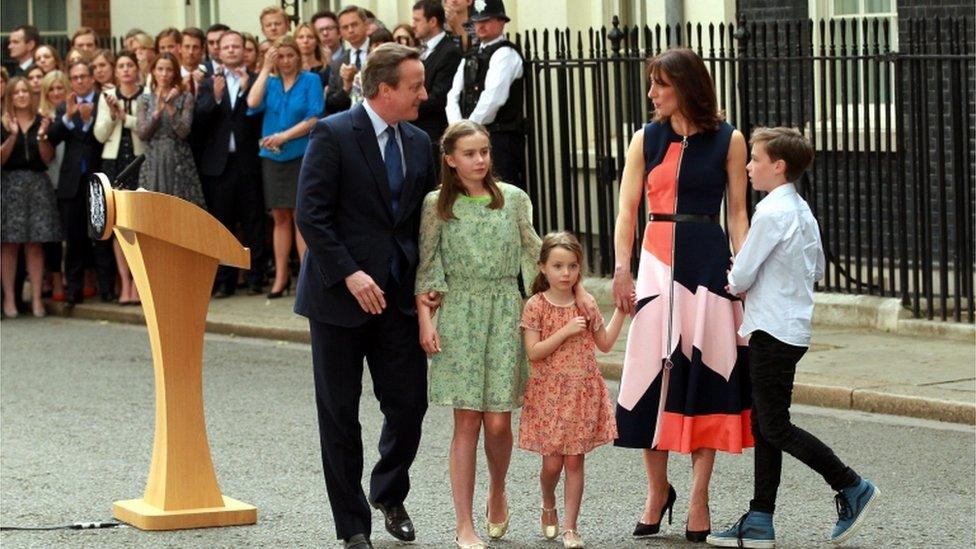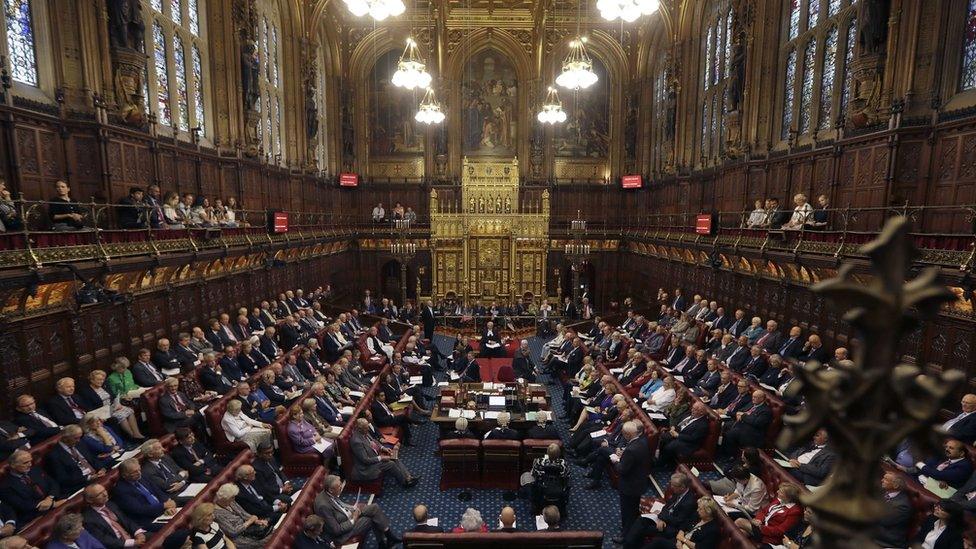John Bercow: Cut the size of the House of Lords
- Published
- comments
Bercow: The House of Lords is too big
The number of peers sitting in the House of Lords should be cut by half to around 400, House of Commons Speaker John Bercow has suggested.
At an event on modernising Parliament he said it was "absurd" the Lords was significantly larger than the Commons.
And, asked about MPs' behaviour, he called sexist remarks "lamentable".
A Lords spokesman said it did not need any "prompting" from the Commons as a peers' committee was already looking into how to reduce the number of peers.
Mr Bercow made the comments during an hour-long conversation with Institute for Government director Bronwen Maddox on the "making of a modern Parliament".
He said that while he favoured an elected House of Lords, he did not think reform of the second chamber was going to happen "any time soon".
"One can argue the toss about the size of the House of Commons, but as far as the House of Lords is concerned, it's frankly patently absurd that the House of Lords is significantly larger than the House of Commons," he said.

Mr Bercow said Mr Cameron was 'very honourable' for quitting as PM after he lost the EU referendum
"I don't say that in a spirit of machismo or personal or institutional pride... but we are the elected chamber."
While there was "a very good argument for a second chamber" that gives MPs pause for thought "it could most definitely be halved in size - and I think most fair minded people would say, it should be".
There are currently about 800 peers in the Lords, although not all of its members regularly site in the chamber, which has about 400 seats. Most have been appointed as life peers, with some hereditary peers and some Church of England bishops.
In December, it was announced that a cross-party committee would be set up to look at how to reduce the size of the Upper House. There are currently 650 MPs.
Responding to Mr Bercow's comments, a spokesman for the House of Lords said: "The House of Lords has stated publicly that it is too large and is taking concrete steps to reduce its size. It doesn't need prompting from the House of Commons as the process is under way."
The Commons speaker also suggested he would allow votes on issues that were difficult for the government, as it continues to try to get its EU Withdrawal Bill through the Commons.
He said: "I have not shown myself reluctant over the years to select amendments for debate and vote which may not be for the convenience of the executive."
He acknowledged that MPs were concerned about the issues of citizens' rights, "economic arrangements" and the use of "Henry VIII" powers by the government and added: "Nothing is too toxic for Parliament to consider."
Mr Bercow also said sexist behaviour in the Commons was "lamentable" and he would "rather welcome" a football or rugby-style yellow card system introduced to warn or send offenders out of the chamber for a cooling off period.
'Basic respect' needed
Even without new rules, Mr Bercow suggested the whip's offices of the major parties could "clearly instruct their MPs to stop the catcalling, stop the ad hominem abuse".
He also called for a "basic level of human respect" among politicians.
Mr Bercow defended his decision to allow Prime Minister's Questions to run on longer than its allotted half hour, adding: "It's open to criticism, but in a sense - what's the hurry?
"This is Parliament. David Cameron very rarely complained, and with great credit to Theresa May, she's never complained to me about it... and I've found her, whatever the criticisms of her or of Jeremy Corbyn, or any other political leader, I've found her nothing but courteous in our personal dealings."
The Speaker said he had allowed PMQs to go on "longer than ever" just before the General Election in June because a large number of MPs were standing down and wanted to ask their last question - some of whom had been in the Commons for decades - "and I thought the House wouldn't mind".
In questions about the EU referendum, the speaker admitted he was "not a great enthusiast" for referendums, arguing that it should not be used "to facilitate effective party management or the crowding out of another political force".
But he thought David Cameron had been "very honourable" to resign as prime minister after he lost last year's EU referendum.
"To be fair to David, he was decisive about it - he had put with very considerably greater force the argument for staying in - in a way that Harold Wilson had done so much more timidly back in 1975," he said.
"And having taken such a strong position and got the opposite result, I think he thought the honourable thing to do was to walk away."
- Published20 December 2016
